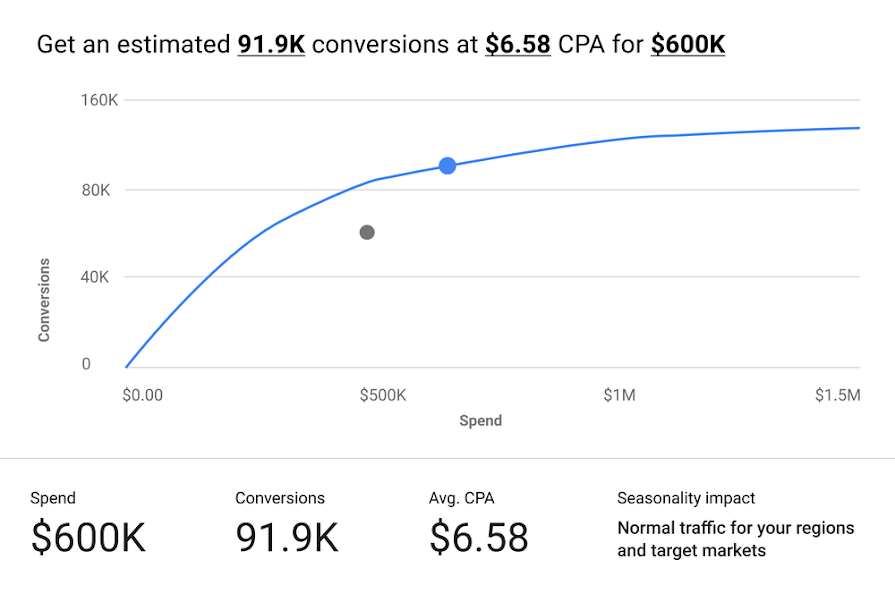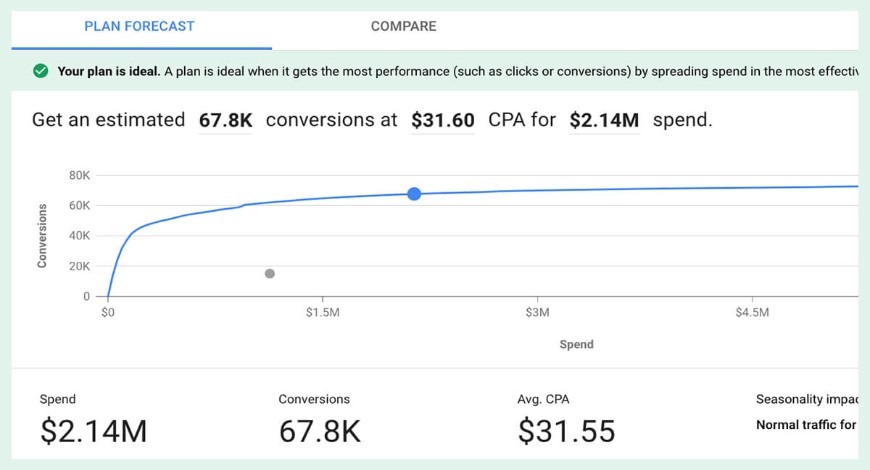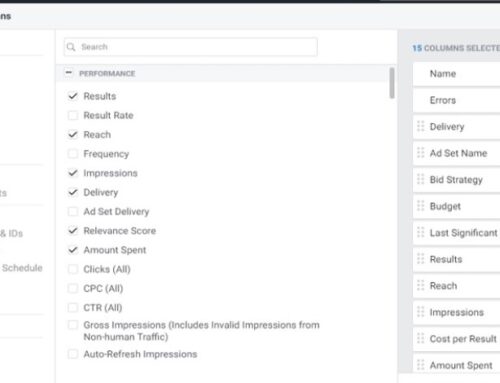How to use Google’s Performance Planner
Google’s Performance Planner is a great tool for businesses who want to budget their Google ads spend for the next month or quarter. If you have ever asked yourself any of these questions below, then you probably should use the Performance Planner to help you decide.
1) How will my campaigns perform next quarter?”
2) Is there a better way to distribute my current spend to drive increased conversions for my current Google Ads investment?”
3) How much budget do I need for my Google Ads to achieve key performance indicators (KPIs)?”
4) How can I use Google Ads to drive more sales, while remaining profitable and further grow my business?”
Google’s Performance Planner is a new forecasting tool that uses machine learning to reveal the possibilities for your Google Ads campaigns. With this tool, you can explore forecasts for your upcoming monthly, quarterly, and annual budgets for current campaigns, while also helping to improve your return on investment.

Performance Planner Helps You Best Optimize Your Budget for the Best Results

It compares your past performance with your existing and future plans
Your account history is used with machine learning for prediction
Performance Planner uses a combination of account history and machine learning to power forecasts. In Google Ads tools, forecasts must meet a certain level of accuracy. As a result, the confidence interval of these forecasts is likely greater than that of other available forecast tools.
Forecasts are based on Google data and your account’s historical performance, and then validated using machine learning. That means Performance Planner plans are more likely to hit KPIs than prior estimation methods.
Performance Planner helps you discover the best bids and budgets so you can drive the most conversions for any spend scenario.
Google claims that its Planner has so far been successful for accounts that use it. Below is an excerpt from their own page.
“Based on 250 random Google Ads Customer IDs*, Performance Planner highlighted how to find an average 43% increase in conversions — for the same investment — by reallocating bids and budgets between campaigns. It’s also been seen to highlight how to grow conversions by 80% for the same CPA (no diminishing returns).”
An average 43% increase in conversions and an 80% conversion growth for the same CPA proves that their machine learning algorithm can better predict how a budget should be allocated than what a human can do. It is recommended to use it monthly to project your ad spending ahead and see how it will affect your KPIs.
One good thing about the Performance Planner is that it has included seasonality in its prediction. So if your an e-commerce business selling golf clubs, the algorithm factors in the increase in sales from Black Friday and Cyber Monday and recommends you to adjust your spending ahead for the month. It helps you take advantage of seasonal trends throughout the year.
Using Performance Planner every month lets you optimize your budgets and bids so you can drive more conversions for the same investment.
Google Performance Planner recommendations
Once you use Performance Planner to create a plan with the target date, campaigns, budget, target conversion volume, and target cost-per-acquisition (CPA) for upcoming periods, the tool will provide one of the recommendations below. These recommendations are campaign settings forecasted to help drive maximum conversions and the most efficient return on your investment for your targeted budget.
Search Manual cost-per-click (CPC) or Enhanced CPC campaigns
Recommended average daily budget and campaign bid scaling (1.5 scaling means + 50% bid scaling)
Search Maximize Clicks or Maximize Conversions campaigns
Recommended average daily budget
Search Target CPA or Target return on ad spend (ROAS) campaigns
Recommended average daily budget, Campaign-level Target CPA, or Campaign-level Target ROAS
You still have to watch over your account
Performance Planner is a planning tool and does not optimize in the Google Ads front end toward forecasted KPIs. If you want to quickly calculate your KPIs, we have created a built-in calculator to help. Unpredictable external factors in a dynamic auction environment can mean Performance Planner forecasts may have discrepancies, so it’s important to continually monitor performance and optimize toward performance targets.
Summary
Should you use Google Performance Planner for your campaign budgeting? Given the benefits stated above and how much the industry is rapidly moving to AI and ML predictive marketing, certainly! It helps you forecast and determine your budgets, while also improving your return on investment.
Remember to use it monthly and separate out your Campaigns base on different marketing goals. For example, if your website is selling tables and chairs, then you might want to create a campaign for each. So that ML can better predict how much you should spend on tables this month, and how much on chairs.





